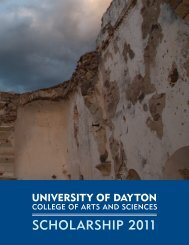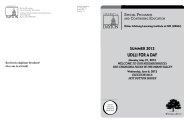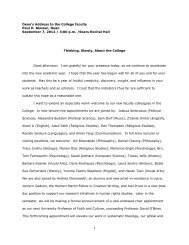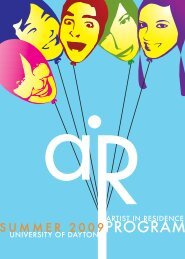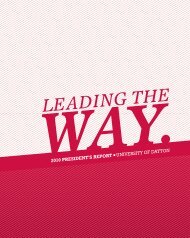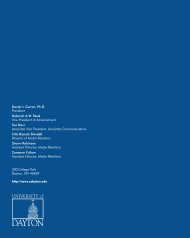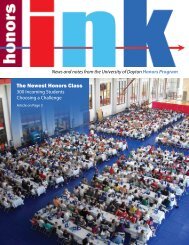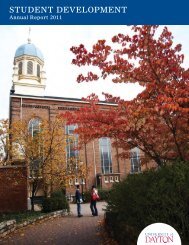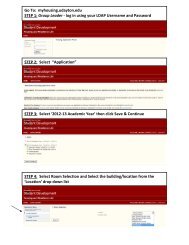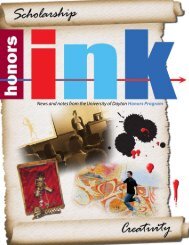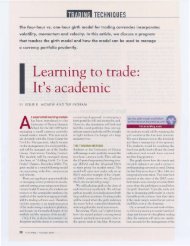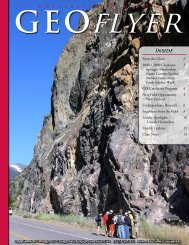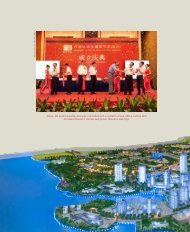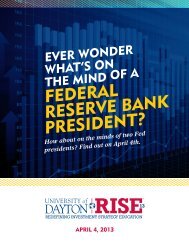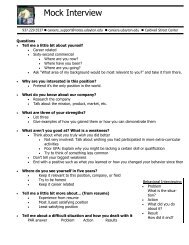Stander Symposium abstract book - University of Dayton
Stander Symposium abstract book - University of Dayton
Stander Symposium abstract book - University of Dayton
You also want an ePaper? Increase the reach of your titles
YUMPU automatically turns print PDFs into web optimized ePapers that Google loves.
9:00 AM to 5:00 PM<br />
HISTORY<br />
Topics in Contemporary Modern Africa<br />
Presenter(s): Ian M Birthelmer, Patrick D Bittner, Annie R Christy, Lindsey E Cummings, Josh M Donohue,<br />
Nicholas M Doyle, Joseph M Edmundson, Acheanyi Fomenky, Fernando E Fuentes, James Harless,<br />
Patrick J Larkin, Micah J Lustig, Zachary D Morris, Leah R Mullen, Jessica<br />
Advisor(s): Julius A Amin<br />
History<br />
1:00 PM-3:00 PM<br />
Course Project, 12_SP_HST_337_01 Kennedy Union - 331<br />
This session will address issues which inform our understanding <strong>of</strong> contemporary African society. Students placed in groups <strong>of</strong> four will research<br />
a topic selected in consultation with the instructor and present their findings at the conference. Topics include genocide, women and development,<br />
totalitarianism, resilience, traditions, religion, and many more. The presentations fit well with UD’s mission <strong>of</strong> engagement, excellence, and<br />
internationalization.<br />
MUSIC<br />
An Investigation <strong>of</strong> Contemporary Assessment in Music Education<br />
Presenter(s): Kelly A Connell<br />
Advisor(s): Linda A Hartley<br />
Music<br />
2:40 PM-3:00 PM<br />
Independent Research Kennedy Union - 311<br />
Measurement and assessment are becoming increasingly important tools to all music educators. National education legislation such as No Child<br />
Left Behind has recognized music as a core curricular subject. Since then, little has been done to assess music students to ensure that a set <strong>of</strong> basic<br />
skills and knowledge is being achieved. While national and state music standards exist, these standards are usually not mandatory and merely<br />
serve as a guide or recommendations for music educators to follow. While other core subjects endure severe oversight and rigorous testing at state<br />
and local levels to measure whether or not students are attaining minimum standards, some music educators are pushing for national testing <strong>of</strong><br />
music students to demonstrate that music has an academically measurable component. Yet other music educators are fearful that assessment <strong>of</strong><br />
music education will have the same negative effects that other core subject high-stakes testing has had on schools. The purpose <strong>of</strong> this research is<br />
to investigate the current debate on national music assessment and whether music education’s place in the core curriculum demands an increase<br />
in oversight through standardized music assessment <strong>of</strong> students in music education classes.<br />
PHILOSOPHY<br />
“Poetry Is Ontology”: Tragedy and Sacrament in Rowan Williams’s Theology <strong>of</strong> the Arts<br />
Presenter(s): Dennis M Cox<br />
Advisor(s): John A Inglis<br />
Philosophy<br />
1:00 PM-1:20 PM<br />
Graduate Research Marianist Hall Learning Space - 206<br />
In a <strong>book</strong> on the theology <strong>of</strong> art, Rowan Williams--the 104th and current Archbishop <strong>of</strong> Canterbury--approvingly quotes Jacques Maritain, saying,<br />
“Poetry is ontology.” The arts, according to Williams, are related to our knowledge <strong>of</strong> being--that is, at its best, art is concerned not simply with<br />
<strong>abstract</strong> beauty or expressing the artist’s will, but with disclosing reality. Integrity in any artistic endeavor, then, is about the struggle <strong>of</strong> seeing the<br />
connections that are there, <strong>of</strong> rendering some sense <strong>of</strong> those connections in another mode, and <strong>of</strong> facing--with unflinching honesty--the totality<br />
<strong>of</strong> human existence, including its finitude and brokenness. After tracing several <strong>of</strong> Williams’s theological-aesthetic themes, this paper argues first<br />
that this theology <strong>of</strong> the arts represents a significant aspect <strong>of</strong> the Archbishop’s thought, and second that his aesthetic is uniquely and importantly<br />
attentive to questions <strong>of</strong> beauty and brokenness--that is, <strong>of</strong> discerning God’s goodness in a wounded world.<br />
118



